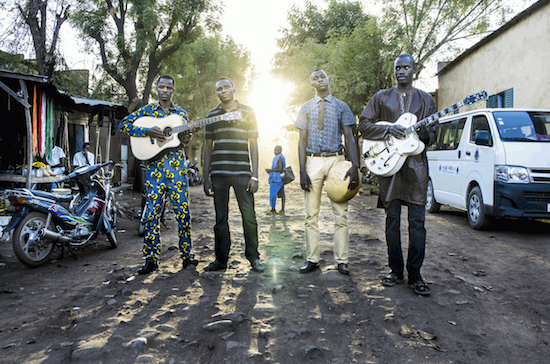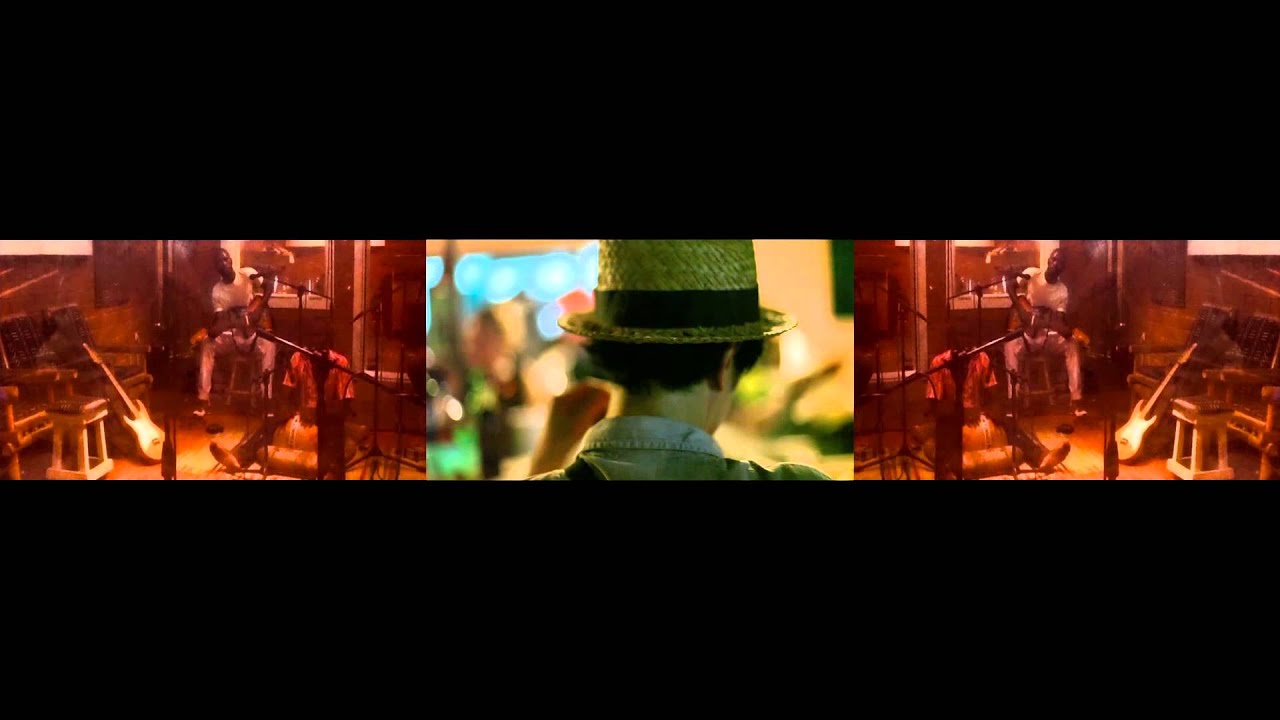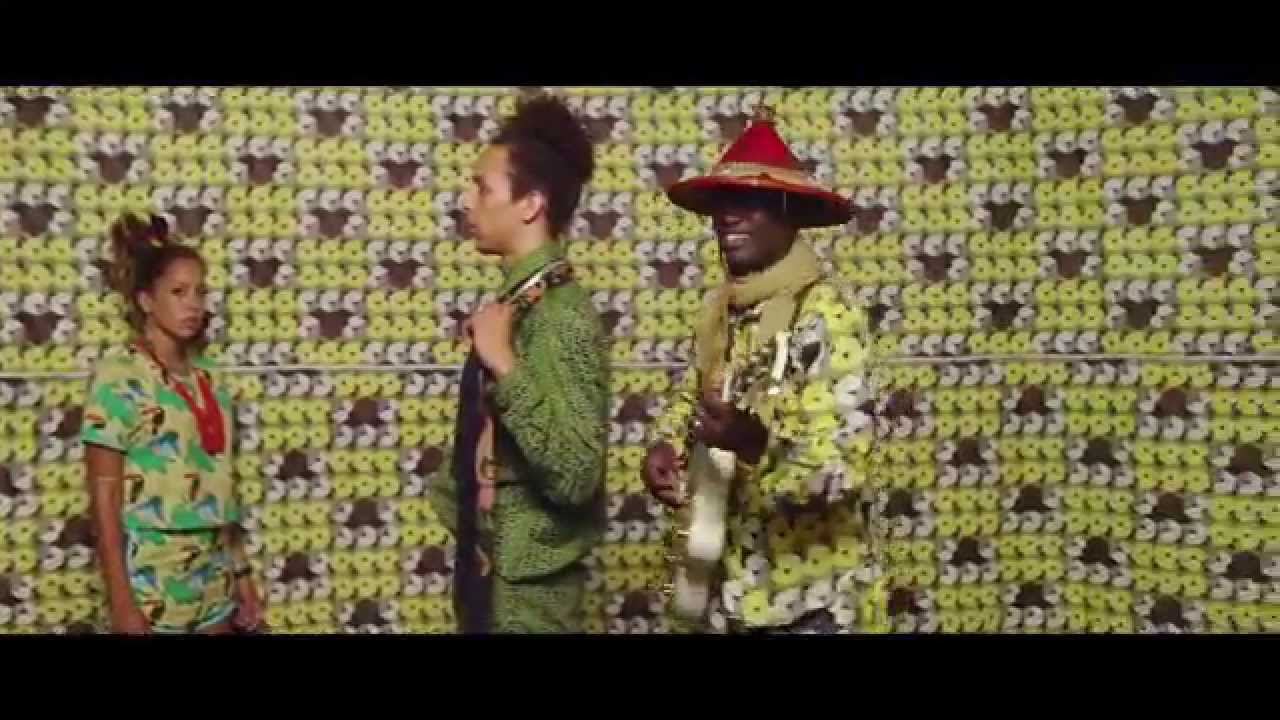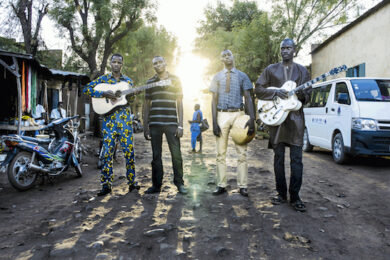Since being discovered in a Bamako club, having gained a reputation as one of the Malian capital’s most exciting live acts, the last 12 months have been a whirlwind ride for Songhoy Blues. In that time the group have featured on an Africa Express compilation, recorded their debut album with Yeah Yeah Yeahs’ guitarist Nick Zinner producing, and recently played at the 5,000-capacity Royal Albert Hall, supporting Damon Albarn. It’s a remarkable chain of events for the group, who formed after being forced to flee northern Mali following the spring 2012 arrival of Islamist militants under whom music was forbidden as they enforced sharia law. The musicians were forced to leave home to avoid the threat of beatings or of having their instruments confiscated or smashed, and found themselves in the right place at the right time when they started playing music together, having relocated.
Vocalist Aliou Touré, guitarist Garba Touré (whose father played guitar and then percussion in Ali Farka Touré’s band) and bassist Oumar Touré had lived and grown up in Gao and Timbuktu respectively, and were studying and playing music prior to the invasion of jihadists. Although they didn’t know each other previously (they are not related), having made the 15-hour bus ride south to Bamako the trio met and teamed up with Bamako-based drummer Nathanael Dembélé. Although a dominant force in the Sahel region of northern Mali up to the 16th century, today the Songhai people make up around 6% of the country’s population. Songhoy Blues formed to play and keep alive the Songhai music from the north, for themselves and other refugees displaced by the ongoing problems. They soon found their audience was not just made up of Songhai people in the area, but also Tuareg, Bambara and others, who all united at early performances.
Late last year the group were spotted in a Bamako nightspot by Marc-Antoine Moreau, who was on a scouting mission for artists to appear on last year’s Africa Express compilation Maison Des Jeunes (which would have featured their track ‘Soubour’). Marc is now managing the group and, with Nick Zinner, co-produced Songhoy Blues’ debut album, Music In Exile. In addition to recent UK dates the group also visited India for a string of festival appearances and are featured in a new Kickstarter-funded film on the current plight of musicians in Mali, They Will Have To Kill Us First: Malian Musicians In Exile.
Ahead of their biggest show to date at the Royal Albert Hall the group had a low-key warm-up gig at private members’ bar The King’s Head in east London, where the basement live room can barely hold 100 people. When we spoke before the show Marc said: "The thing with Songhoy Blues, what I really found when I saw them first was I saw a rock band. I hadn’t seen an African act, I saw a rock band. They are all taking decisions together. They are totally like a rock band coming from Manchester or Glasgow going out of school and that is a good thing, an interesting thing. And also, the way we worked, we tried to develop this project, we tried to avoid totally the ‘world music’ scene. We want to consider them as a regular rock band as the two other bands who are going to play tonight."
As Songhoy Blues blast through the bulk of their new record that night it is clear what Marc means. They really rock, playing with a passion that transfers to the audience, as heads nod and hips inevitably give way to shaking to the slinky grooves. Although one of their slower numbers, set opener ‘Sekou Oumarou’ unwinds around call-and-response vocals, as the group ease into their full flow, with ‘Nick’ rolling on a Canned Heat boogie riff, with some dramatic breakdowns. Garba’s sinewy guitar playing mixes bluesy riffs with highlife rhythms and hypnotic solos as Oumar and Nat lock into relentless trance-inducing grooves. Frontman Aliou delivers his lines with an emotive intensity and interacts with each band member, with off-mic yells and shoulder strutting dance moves as, track by track, the group build and build their intertwining polyrhythmic sounds to frenetic levels.
By the final two numbers, forthcoming single ‘Al Hassidi Terei’ and ‘Soubour’ there is a real party atmosphere in the crowded room. As the group are cheered back onstage for an encore, just to make sure you don’t forget it, they play ‘Al Hassidi Terei’ again, so the repeated chorus melody is fully stuck in your head, the track’s descending riff an example of why their refreshing sound has been described as ‘desert R&B’. Together Songhoy Blues are something else and, having resisted being silenced, the smiles on their faces at the end of the show defy the experiences that brought them together as they are now getting to see the world playing their music.
The music you are playing has a different feel to what listeners here may have heard before from Mali, like Ali Farka Touré – who I know you have connections to and have played his music as well – and then Tuareg bands like Tinariwen and Tamikrest. I’ve seen it described as ‘desert R&B’, is that a fair description?
Garba Touré: There are plenty of similarities from Ali Farka Touré for sure, but also from the Tuareg people like Tinariwen. At the same time we have our own influences other than those we were talking about before. If you listen to a track like ‘Soubour,’ for example, it has nothing to do with Ali Farka, it’s nothing to do with Tinariwen. We have set up our own sound – and now when you listen to that it is Songhoy Blues. But if you take another track, like ‘Irganda’, this is more similar to what Ali Farka could be doing.
Before you came to Bamako, what were your musical projects?
GT: Aliou was working with a band in Gao and I was playing as a guitarist in a band in a town close to Timbuktu, and at the same time we were students, and while we were students we always played music as well. We were playing in different cities in the north, there were plenty of festivals, like Festival au Désert, it was easy to play and I have played there with another band, and then we had to face the problems. After that we had to go to Bamako.
Marc, how did the group come to your attention?
Marc-Antoine Moreau: I was cutting music [in Mali] for the Maison Des Jeunes project, and I went there two weeks before and I went all over Bamako and everywhere. I have known Bamako for over 20 years and a sound engineer, who used to do sound for them in a small bar, talked to me and said, "Oh, you should check out this band, they are from Timbuktu, they are very interesting." And so I went to a bar called Tropicana and the music was amazing, kind of what you are listening to now, blues rock, with that strong influence, and I just really loved it. I am good friends with Nick Zinner and when he arrived to work on the project I was sure that this band was dedicated to work with Nick for sure.
They did one track for the Maison Des Jeunes project and after they came to London for the launch show for the album [at Oval Space in December 2013] and it was really cool. Nick was there and I asked if he was open to going back, and he said yes, and we made the album in April, four months later.
Was there much input from yourself and Nick in the sound?
MAM: It’s really what they play. I remember in February we wanted to record all the songs we could as demos before we recorded in April and I sent that to Nick and then we talked together and we decided to go to Bamako to make a selection of the tracks and work with them, but it is basically their stuff. The impact is about a few guitars that Nick has brought into it, and how we treat the song and a few things that we add on top. But it is not an overproduced project, that was not the goal.
Over the last year things have moved really quickly, from playing back home, to coming here and playing with Damon Albarn this weekend at the Royal Albert Hall…
GT: It is fast, but it depends on the competency of the manager!
MAM: But I would say they are so good. And that is the main thing. And it is true that what has happened in one year’s time – I met them a year ago – is amazing. But it is also amazing to get a band that is only two years old who has got that element and that efficiency, and it is really them. But for Garba, living in a musical family, hearing Ali Farka every day, and Aliou being really committed to his lyrics and his writing – nothing happens by hazard. And if it goes that quick, it is because they are that good!
Aliou, can you please explain the meaning and message of ‘Soubour’?
Aliou Touré: ‘Soubour’ is about patience. And in life, for all you intend to do, you need patience and you need to be courageous and patient to get what you want. We have been patient and we were all expecting something to come, but we were not imagining that what would come first was a war that has obliged us to go to Bamako, to set up a new band there and meet the people from Africa Express and from there going to now. We were not expecting that even if we were waiting for something to come. So the theme of patience is all about that. There is a proverb: "Do what you need to do and desire will come by itself."
And the new single ‘Al Hassidi Terei’, can you tell us about that?
AT: It is about selfishness. In Africa, for example, sometimes if things don’t move that much sometimes it is because people are a bit selfish, so it’s all about that and we try to avoid this. Because it is only all together that things are possible.
The album’s closing tracks, ‘Mali’ and ‘Desert Melodie’ seem to have a nostalgia for the country as you may want to remember it.
AT: In the track ‘Mali’, it is really a picture of the country at the moment and I am using the first president of Mali, Modibo Keïta [in office 1960-68], and I am asking what he would think about what Mali has become now. So this is really a picture of what Mali is today, so I would not say it is that optimistic. And ‘Desert Melodie’ is mainly about the jihadist guys, who don’t let us play music and say that if you don’t pray you are not a good Muslim man and that you are not allowed to play music. Those people have said that we are not good Muslims, and yet the Tomb of Askia [believed to be the burial place of one of the Songhai Empire’s most prolific emperors, Askia Mohammad I] in Gao has existed for ages, for centuries, and this is a Muslim thing, and also the Sidi Yahya Mosque in Timbuktu, these are very strong Muslim things and we cannot hear that we are not good Muslims.
You also feature in the new film, They Will Have To Kill Us First. How did you get involved in that?
GT: After we came to London, Andy Morgan, who is part of Africa Express and a journalist, went to Mali in February with the film crew who were starting this movie. He introduced them to us as they were looking for bands coming from the north and the story of Songhoy Blues fitted in with the way the movie was being made. The question that Aliou is asking in that video is that if there were no wars and no cries then maybe this band would never have existed, so that is a positive thing.
What is your message now about what is happening in your country when you play to people outside of Mali?
GT: We are here to promote our culture and we want to play our music to the maximum amount of people and we want to show the world that we are Malian music, and within Malian music we are the Songhai music.
Music In Exile is out on February 23 via Transgressive Records. Songhoy Blues have just been shortlisted for the Index on Censorship Freedom of Expression Award 2015. The band are currently playing a headline tour of the UK; have a look at the dates below and get hold of tickets here:
JANUARY
Tue 27 – The Harley, Sheffield
Wed 28 – West End Centre, Aldershot
Fri 30 – Magic Cinema, Tywyn
Sat 31 – Colston Hall, Bristol
FEBRUARY
Mon 2 – Oslo, London
Tue 3 – Sunflower Lounge, Birmingham
Wed 4 – Clwb Ifor Bach, Cardiff
Thu 5 – Discovery Centre, Winchester





